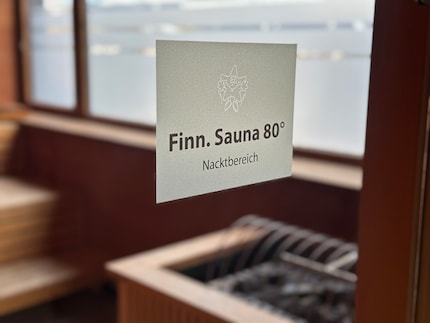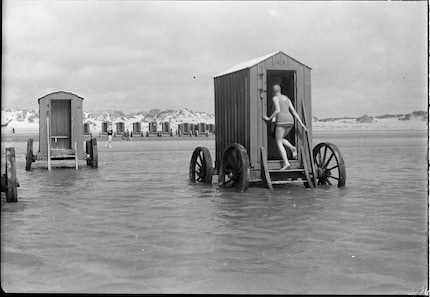
Background information
We love to lüft: the very German and Swiss art of airing a room
by Katherine Martin

If you want to enjoy the searing heat of a German or Swiss sauna, you’ll have to strip off your swimsuit first. For a Brit like me, sitting in the nude alongside a bunch of strangers sounds like a horrifying prospect. But is being in the buff in public really as mortifying as I’ve been conditioned to believe?
Of all the culture shocks an expat from the English-speaking world can experience in Germany or Switzerland, the difference in sauna etiquette is up there with the most jarring. As a Brit, I’m used to swimwear being strictly mandatory in saunas. So, you can imagine my surprise the first time I rocked up to one in Germany and found out it was a «textile-free» space. I hovered for a moment by the entrance, pondering whether to just grit my teeth and bear all. Then, I chickened out and headed back to the pool.
Compulsory nudity, however, doesn’t seem to deter the Germans or Swiss. According to a 2022 survey, 26.14 million people in Germany «occasionally» or «frequently» visit saunas or steam rooms in their free time. Famously, Angela Merkel was taking her weekly sauna when the Berlin Wall fell. In a worldwide ranking of the number of Google searches for «sauna», Germany came out 4th, with similarly sauna-crazy Switzerland taking 7th place.

Keen to find out why all this enjoyment needs to take place naked, I visit the German Sauna Association’s website. Addressing the nudity question in its FAQs section (in German), the organisation says: «The heat of the sauna is meant to reach the skin without hindrance, with the evaporation of sweat undisturbed. It’s neither pleasant nor hygienic to sweat into a swimming costume that was possibly manufactured using synthetic material.»
So, is the discomfort around stripping off for the sauna simply a me-problem? Apparently not. According to a 2014 YouGov poll, 59% of British people are either out-and-out uncomfortable naked, would prefer not to say, or are unsure. Women (63%) are significantly more likely than men (36%) to feel uncomfortable in the nude. Contrast this with the figures on public nudity in Germany. In 2021, Statista asked Germans about places where they’d been naked before. Thirty-seven per cent said they’d got their kit off for the sauna, while a quarter said they’d gone to the beach au naturel. Almost a fifth said they’d been naked at a lake.
In Switzerland, the «Luzerner Zeitung» reported on the culture clash that sometimes occurs when guests from non-sauna-going nations visit spas in Swiss resorts. In the article (in German), the General Manager at Fitnesspark National says that reminding people to whip off their swimsuits before hitting the sauna is a daily occurrence for his staff. Meanwhile, an employee at Hotel Palace in Lucerne mentions that Swiss spa-goers feel particularly disturbed by the sight of swimwear in the sauna, often reporting rule-breakers at reception.
In a video about Switzerland’s lax attitude to nudity in gyms, Canadian expat Emily Engkent says of Swiss women: «They’re not just changing and being briefly naked. They’re hanging around, talking to each other naked. They’re on their phones naked. They’re blow-drying their hair naked.» In the comments section under the video, Swiss viewers are flabbergasted by the Anglosphere’s apparent prudishness.
So, what made people in Germany and Switzerland able to sit starkers in the sauna without thinking twice, while Brits struggle to even drop their towels in the changing area?
The question takes us back to the 19th century and the genesis of «Lebensreform» (life reform) – a cluster of social movements that took off in German-speaking countries in response to industrialisation. It promoted natural medicine, vegetarianism, abstinence from alcohol and sugary foods, and, crucially, stressed the health benefits of nudity. Switzerland’s Arnold Rikli, a painter and «life reformer» who became known as «the sun doctor», was an early proponent of nude pursuits such as sunbathing and hiking. As Eva Locher, a historian who’s documented «Lebensreform» in Switzerland, points out, there was even a push for nude ski-ing.
Nude exercise also caught on in Germany, where the practice was idealised in the critically acclaimed 1925 film «Wege zu Kraft und Schöhneit»(Paths to Strength and Beauty). This side of «Lebensreform» spawned «Freikörperkultur» or FKK (Free Body Culture), the practice of communal nakedness in the great outdoors still established today in the form of nudist beaches, campsites and lakes across the country. Against the backdrop of an oppressive, totalitarian state, FKK enjoyed huge popularity in the former East Germany, where stripping off was seen as an expression of freedom. Decades after the fall of the Berlin Wall, nude sunbathing’s still all the rage on Germany’s most northeasterly beaches – much to the chagrin of their more conservative, Polish neighbours.
While the German-speaking world was discovering the joys of frolicking naked in the sunshine, things were rather different in Victorian Britain. In the 19th century, being spotted in even a full-length bathing suit was seen as «immodest». Nothing encapsulates this more than the bathing machine, a wooden cubicle on wheels where beach-goers could get changed in private. Safely in their swimming costumes, bathers could then signal for a horse to pull the cabin towards the water. This way, they could jump straight from the bathing machine into the sea without doing «the walk of shame» across the beach in their swimming costumes. The machines were ubiquitous on British beaches until 1901.

Britain didn’t get its first nudist beach until 1979, almost 60 years after they emerged in Germany. Even then, it was met with considerable political and public resistance. John Blackman, a Brighton town councillor who opposed the beach, said at the time: «I personally have no objection to people showing their breasts and bosoms and general genitalia to one another. Jolly good luck to them, but for heaven’s sake, they should go somewhere more private.»
Both the invention of the bathing machine and the objections to nudist spaces may have been fuelled by a common argument: that nudity is inherently sexual. In an interview with British newspaper The Metro, body confidence coach Judi Craddock says: «I think many people confuse nudity with sex when they aren’t the same thing. A lot of the nudity we’re exposed to in the media is sexual in nature, which goes some way to explaining why being naked in front of a friend or a stranger can feel embarrassing.» Perhaps having a history with «Lebensreform» and FKK means people from German-speaking countries aren’t as quick to link nakedness with sex. When Statista surveyed Germans on which characteristics and feelings they associated with nudity, «sexual arousal» did, in fact, score lowest, with 13%.
Determined to see if I can cast aside my inhibitions around stripping off, I head to a thermal spa, taking a Russian friend (and seasoned banya-goer) with me for moral support. There’s a veritable smorgasbord of saunas, from a «meditation sauna» to a classic Finnish variety. But before we can go in, my first nudity challenge awaits: a large, grey-tiled, communal shower area, reminiscent of the kind you’d get in a school block. Unlike my school changing rooms, however, nobody’s grasping their towels like their lives depend on it. A lot of people have brought bath robes for the short walk between the showers and saunas. Just as many, however, are strolling between them, naked as the day they were born.
When I initially drop my bikini bottoms, there’s a little jolt of panic. Like the kind you get in one of those anxiety dreams where you’re at school, suddenly realise you’re naked on the school yard and everyone’s pointing and laughing. (Do these kinds of nightmares even exist in Germany and Switzerland?) Aiming for the same kind of nonchalance everyone else is exhibiting, I step out of the showers and merge into the general multitude of skin tones, freckles and varying degrees of hairiness on show. Before long, I’m putting honey and salt on my skin in the «panorama sauna» with everyone else as if I know exactly what I’m doing. It really does feel better not to have wet swimwear clinging to my skin, making puddles on the benches. The heat is relaxing without being soporific. Emerging into the open air and showering, I enjoy the tingly contrast between hot and cold. My body feels energised. I don’t feel self-conscious or judged about my own nudity, nor do I feel disturbed by anyone else’s. In fact, the weirdest thing about the experience is that it doesn’t feel weird at all.
Do you feel comfortable being naked in saunas? What’s the etiquette on saunas in your home country? I’d love to read your thoughts in the comments section.
Originally from Scotland, Kate joined the team as an English translator after stints as a journalist, press officer and ESL teacher. Since leaving her homeland for Germany in 2017, she's been gallivanting around the country, navigating the linguistic challenges and cultural faux pas that inevitably come with it.
Interesting facts about products, behind-the-scenes looks at manufacturers and deep-dives on interesting people.
Show all
Background information
by Katherine Martin

Background information
by Martin Jungfer

Background information
by Anika Schulz